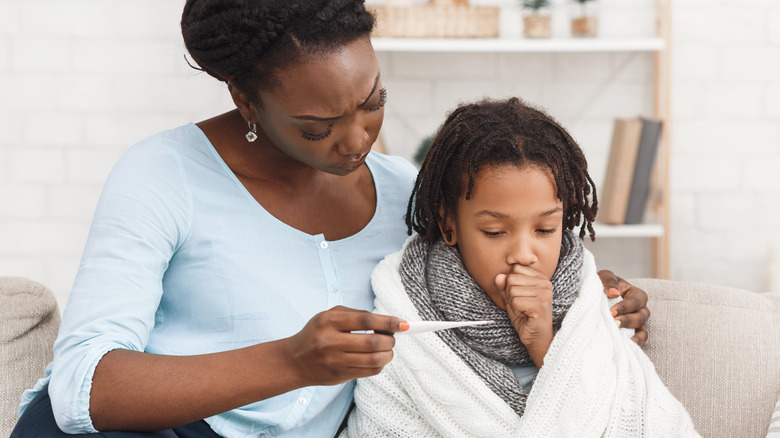Health Experts Offer Advice On What To Do If You Can't Find Children's Cold Medications This Winter
Children's cold medications are flying off pharmacy shelves in some areas across the country, leading to what William Schaffner, infectious disease specialist and professor of preventive medicine in the department of health policy at Vanderbilt University School of Medicine, describes to The Washington Post as "spot shortages." Despite the difficulties some families have faced in accessing these medications, Johnson & Johnson clarified to NPR that no national shortage of Children's Tylenol or Children's Motrin has been formally declared. "Consumer demand for pediatric pain relievers in the U.S. is high, but there are no supply chain issues and we do not have an overall shortage in the U.S.," company representative Melissa Witt told the news outlet in an email.
Experts cite increases in viral case numbers related to the tridemic as the reason for heightened demand, reports NPR. In response, CVS has restricted customers to two purchases of all over-the-counter children's pain medications (via The Washington Post). Similarly, Walgreens now allows only six online purchases of children's cold medications. WebMD reports that in a recent announcement, Johnson & Johnson Consumer Health addressed shortage concerns, stating that they are increasing production by operating around the clock seven days a week.
Alternative treatment options for children
In the event that you're unable to find brand-name children's cold medications at your local drug store, experts offer their advice for what caregivers can turn to instead. Joanna Dolgoff, a pediatrician and spokeswoman for the American Academy of Pediatricians, told The Washington Post that consumers can purchase generic forms of these drugs instead — meaning acetaminophen or ibuprofen. However, experts emphasize that children should only ever be given children's doses of these medications — not adult doses, which can be harmful. Always consult with your child's pediatrician to help determine the proper amount. Keep in mind that children should not be given aspirin.
Aside from medications, caregivers can also take other measures to treat their child's illness. For children experiencing fever, set their room at a cool temperature and keep air circulating with a fan (per The Washington Post). Additionally, be sure they consume plenty of fluids. Using a washcloth to dab the child with mildly warm water can also be helpful. Furthermore, USA Today adds that the use of a cool mist humidifier can help relieve respiratory discomfort. However, infants 2 months old or younger who develop a fever of 100.4 degrees Fahrenheit or higher should be seen by a physician. Additionally, kids with a fever that persists for three to five days should also be seen by a doctor (via WebMD). In the event that a very high fever comes on abruptly for a child, seek medical attention immediately.


